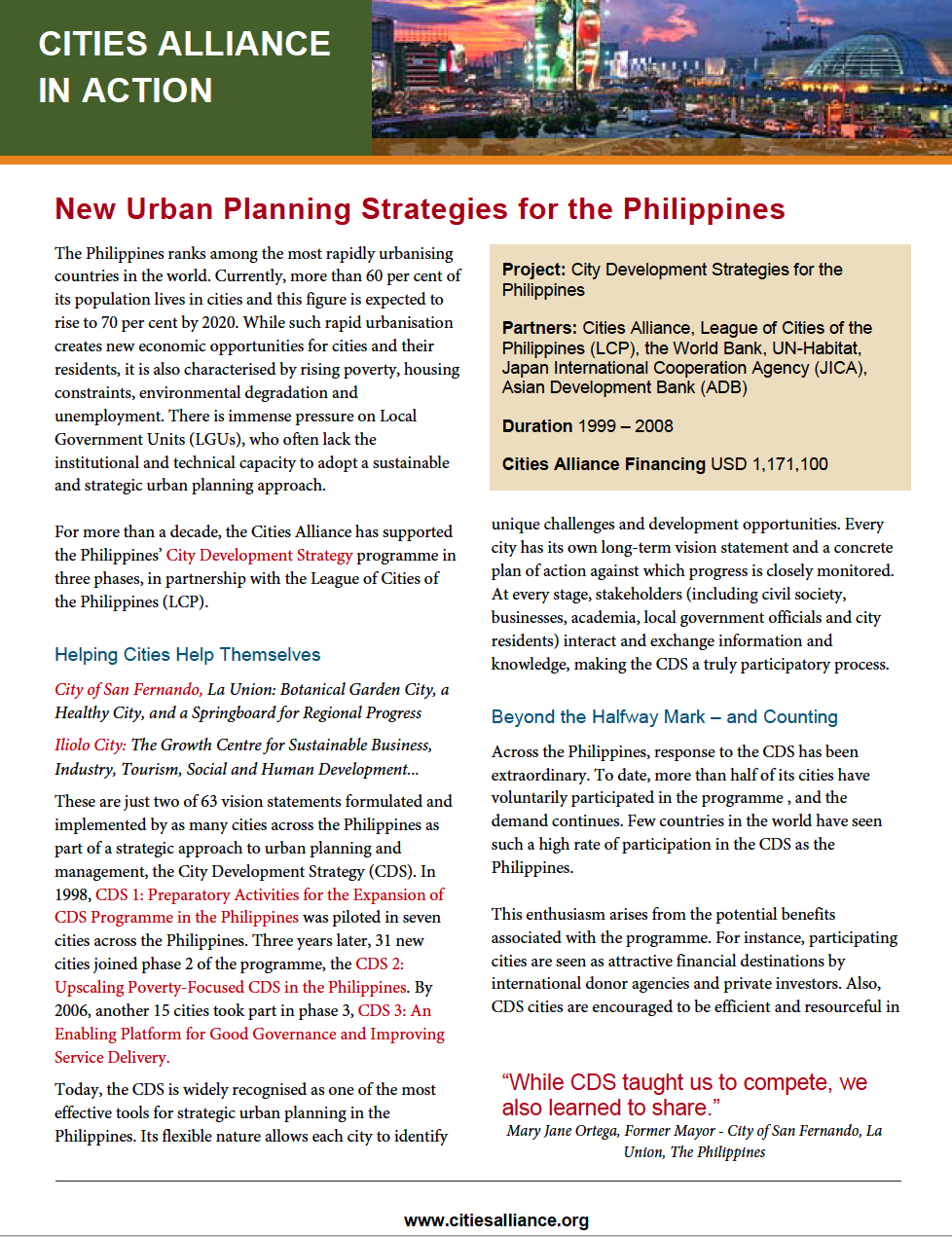- Who We Are
- How We Work
- Regional / Country Initiatives
- Legacy
- Core Themes
- Working Groups
- Portfolio & Results
- Newsroom
- Resources
New Urban Planning Strategies for the Philippines
The Cities Alliance has supported the Philippines’ City Development Strategy for more than a decade in partnership with the League of Cities of the Philippines (LCP).
The Philippines ranks among the most rapidly urbanising countries in the world. Currently, more than 60 per cent of its population lives in cities and this figure is expected to rise to 70 per cent by 2020.
While such rapid urbanisation creates new economic opportunities for cities and their residents, it is also characterised by rising poverty, housing constraints, environmental degradation and unemployment.
There is immense pressure on Local Government Units (LGUs), who often lack the institutional and technical capacity to adopt a sustainable and strategic urban planning approach.
For more than a decade, the Cities Alliance has supported the Philippines’ City Development Strategy programme in three phases, in partnership with the League of Cities of the Philippines (LCP).
Helping Cities Help Themselves
City of San Fernando, La Union: Botanical Garden City, a Healthy City, and a Springboard for Regional Progress
Iliolo City: The Growth Centre for Sustainable Business, Industry, Tourism, Social and Human Development...
These are just two of 63 vision statements formulated and implemented by as many cities across the Philippines as part of a strategic approach to urban planning and management, the City Development Strategy (CDS). In 1998, CDS 1: Preparatory Activities for the Expansion of CDS Programme in the Philippines was piloted in seven cities across the Philippines.
Three years later, 31 new cities joined phase 2 of the programme, the CDS 2: Upscaling Poverty-Focused CDS in the Philippines. By 2006, another 15 cities took part in phase 3, CDS 3: An Enabling Platform for Good Governance and Improving Service Delivery.
Today, the CDS is widely recognised as one of the most effective tools for strategic urban planning in the Philippines. Its flexible nature allows each city to identify unique challenges and development opportunities. Every city has its own long-term vision statement and a concrete plan of action against which progress is closely monitored. At every stage, stakeholders (including civil society, businesses, academia, local government officials and city residents) interact and exchange information and knowledge, making the CDS a truly participatory process.
Beyond the Halfway Mark – and Counting
Across the Philippines, response to the CDS has been extraordinary. To date, more than half of its cities have voluntarily participated in the programme , and the demand continues. Few countries in the world have seen such a high rate of participation in the CDS as the Philippines.
This enthusiasm arises from the potential benefits associated with the programme. For instance, participating cities are seen as attractive financial destinations by international donor agencies and private investors.
Also, CDS cities are encouraged to be efficient and resourceful in fundraising and allocation. This is critical since funding for the CDS in the Philippines is thinly distributed among a large number of cities.(1)
The fiscal prudence of CDS cities has other advantages as well. Congressman Mel Sarmiento, a former Mayor of Calbayog City, explains: “CDS cities stand out in terms of their design and programmes. The transformation, but more importantly the institutionalisation of this transformation, is evidenced by the fact that CDS cities are those who are often recognised by award-giving bodies like the Galing Pook Award and National Competitiveness Council.”
The CDS programme has also led to knowledge sharing through online platforms, workshops, city-to-city tours and other activities for city mayors and staff. For instance, based on information gathered from other CDS cities, Iliolo City implemented a house-numbering system which was not initially part of its CDS.
Mary Jane Ortega, former Mayor of City of San Fernando, La Union says, “While CDS taught cities to compete it also taught us to share. This sharing tightened the bond between cities.” Ortega also highlights that this knowledge sharing has led to a replication of the CDS programme beyond the city level. She says, “Our city shared the CDS process at the barangay (village) and municipality level in our province.” This replication has occurred in other provinces as well.
Lessons Learned from the CDS Success Story
The scale at which the CDS programme operates in the Philippines is a testimony to its success. From the outset, the active participation and commitment of mayors and city officials have proved critical. Constant efforts are required to ensure their continued support. In particular, new mayors must be engaged and oriented with the CDS so that political support for it continues despite regime change.
Led by mayors who serve as ‘champions’, many cities in the Philippines have locally institutionalised the programme to an extent that it works harmoniously with existing planning frameworks such as the Comprehensive Development Plan (CDP) and Comprehensive Land Use Plan (CLUP). However, the CDS has not yet been incorporated in national policy-making. This must be addressed in order for the CDS projects to be aligned with the development priorities of both, city and country.
Finally, CDS cities in the Philippines can benefit from robust mechanisms to monitor socio-economic progress as a result of the programme. This has implications for project monitoring and evaluation and contributes to the ability of the Cities Alliance and LCP’ to identify and support CDS cities which need further attention.
(1) With so many cities participating in the Philippines CDS programme, there is a resource dilution. For instance, under CDS 2 and 3, each CDS city received approximately USD 24,000 from the Cities Alliance. This is in stark comparison to the Vietnam CDS programme, in which each of the two participating cities received USD 125,000.
|
| “While CDS taught us to compete, we also learned to share.” Mary Jane Ortega, Former Mayor - City of San Fernando, La Union, The Philippines |

